Decade in Review: Top Singles 30-11

When Kanye West sampled “Young Folks” on a 2007 mixtape – and later performed the track with Peter Bjorn and John on-stage in Europe – one couldn’t help but chuckle at the irony. Here was hip hop’s world of boisterous, sometimes misogynistic sexual exploits embracing a song about far more modest view of gender relations: less conquest, more discovery. Neither Peter Moren or guest vocalist Victoria Bergsman seem to have any idea what they’re getting into as the conversation flows, the hours fly by and their fellow bar patrons vanish into the night. It’s a testament to the power of accidental romance. Oh, and whistling, obviously.

Though not the record’s biggest hit, nor its greatest genre experiment, “Holiday” is American Idiot’s most important song by a country mile. Without it, the record’s teenage angst and alter-ego romanticism would risk seeming shallow, vain and – dare it be said – downright emo. But on “Holiday,” Billy Joe Armstrong finally grows the balls to pull back the curtain on the band’s slacker/stoner image and ask why their protagonists feel so isolated and alienated from the rest of society. What the resulting imagery lacks in originality, it makes up for in volume and vinegar. For years, the band was unfairly compared to The Clash simply due to a similar sound and small flashes of ambition. On “Holiday,” Green Day finally earned such a prestigious namedrop.
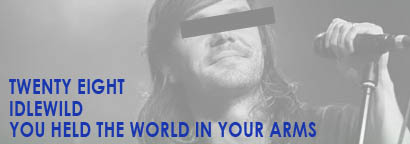
In 2002, Scotland’s Idlewild were in transition between their punkish roots and the anthemic stadium-seeking act they were about to become. 2000’s 100 Broken Windows sat on the first side of the divide; most of their breakthrough record The Remote Part fell on the latter. But Remote’s opening song – the exhilarating, riveting “You Held the World In Your Arms – bridges the gap by inexplicably managing to still sound brash as a chorus of strings and overdubbed guitars blast through the speakers. Like many music geeks, I generally lament how mastering techniques have wiped the nuance out of many recordings, but on “You Held the World” I don’t care one bit – hell, I usually turn it up even louder just to feel the walls shake.

When we reach a Blade Runner society and robots become physically indistinguishable from humans, “Hey Ya” will be an important litmus test to help determine a person’s humanity. Seriously, is there anyone with a pulse who doesn’t enjoy this song? I’ve seen senior citizens run to the dance floor at weddings for this one, grabbing the hands of their grand neices and nephews and shaking it like a Polaroid picture. Andre 3000’s The Love Below may have been a wee bit of a mess, but his amalgam of hip hop and old-fashioned soul produced a pop song that will survive for generations. Future robot-hunters will thank us for it.

It’s an open question as to whether or not “Falling Slowly” would be remotely memorable had it not appeared in Once, but ultimately a pointless one. We could ask that of so many songs in the music video age, and frankly, of songs in general. We don’t listen to music in a vacuum, and a song’s context is as much a part of its story as the chords and lyrics. In the case of “Falling Slowly,” it’s the soundtrack to four of the most magical movie minutes of the decade, as the film’s protagonists tease their way through the song, less performance than courtship. It’s a naked, intimate experience that renders the song equally naked and intimate on its own, even when performed in front of millions at the Academy Awards.

Dance music of the 2000s owes a huge debt to Daft Punk’s Discovery - and “One More Time” in particular – for shamelessly making disco cool again. In one spectacular track, two robots manage to obliterate the 1990s obsession with grungy authenticity and angst-ridden rockers and build a club track that even those of us who were high school rockists at the time couldn’t ignore. It’s a song so massive that even the band’s Toronto-based tribute collective can get the crowd to dance their faces off as if they’re hearing the real thing for the first time, one more time.

Spoiler alert: Hot Fuzz does not make my Top 50 albums of the decade list. Had the Killers released their breakthrough debut as an EP, though – cutting off the filler-filled second half in favor of the flawless power pop of its first five tracks – it might well have been a contender. And the highest of the first side’s highlights is “Mr. Brightside,” a passionately neurotic ode to sexual angst with an arpeggio riff that’s keeps the tension tightly wound until it explodes in boistorous synthizer chords. Never before has a such a clearly false expression of confidence sounded as confident as it does when Brandon Flowers croons the chorus at the top of his lungs.

Jose Gonzalez’s cover of this song – famously used in a popular Sony ad – probably won more hearts than it sold televisions. But beyond being pretty, it served two more important purposes: it earned The Knife enough money to support the recording of the creepy, brilliant Silent Shout, and it introduced the masses to 2004’s original take on the song, a version more proudly romantic than Gonzalez’s quiet, understated version. After all, these aren’t the lyrics of a sweet, unassuming love affair: these are spinning, twirling confessions of bliss that Karin Dreijer Andersson sings with every ounce of distorted joy she can conjure up.
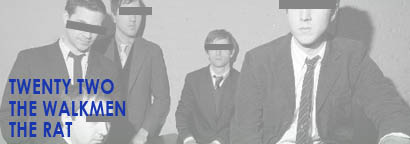
For all my appreciation for calculation and craft in rock music, there are times when all I want to hear is something on the verge of falling apart at any second, teetering on the skinny tightrope of togetherness. So it is with “The Rat,” the Walkmen’s impassioned hit that bleeds the eardrums with sprawling chords and breakneck drums. I love how the song’s bridge tries to calm the fury by stripping away the madness, only to have it sprawl back into the song and explode into passionate panic all over again. The final chord is less a moment of accomplishment than inspired relief.
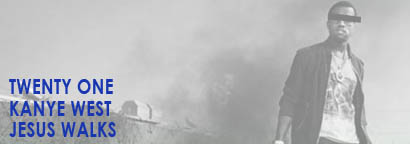
The first singles from The College Dropout tended to reinforce Ye’s “Bentley and a Backpack” image, as opposed to really giving a sense of the record’s scope and ambition. Thankfully, though, someone had the mind to release the epic, apocalyptic “Jesus Walks” to radio. I’ve always thought that the anxieties Kanye voices in the track – about how rapping about God won’t get played – were falsely modest. Did he really not think that the song’s vocal hook and gospel chorus was a hit just waiting to happen? Did he really not see that gangster rap was a shell just looking for someone to shatter it? Did he really not see that his star was about to shoot into the stratosphere? (Actually…I kind of think he saw that last one coming.)

As it should, the bridging of the great pop/alternative divide has inspired traffic in both directions, though for most of the decade it was the pop tracks sounding alternative that got the press. Then along comes this weird, wonderful band from Brooklyn fronted by a David Byrne apostle and two beautiful, harmonizing women who – in the middle of a weird, wonderful record – deliver an indie rock ode to R&B every bit as massive as the era’s biggest pop hits. No song towards the decade’s end demanded immediate and devoted attention in quite the same way. And when Beyonce’s sister Solange released a covered of the song last month, the circle of life was complete. Pop is alternative. Alternative is pop.
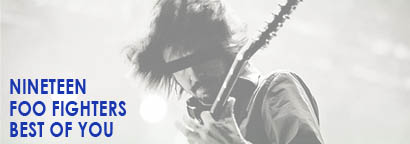
The Foo Fighters are a good band that has generally been content with simply good. They’ve spent over 15 years being dependable, but rarely producing the sort of material that deserves intense devotion. But like “Everlong” eight years earlier, “Best of You” unexpectedly breaks that mould by breathing hunger and fury from every note. Eschewing any sort of obvious verse-chorus-verse pattern, the song fights every urge to be formulaic and predictable and ends up perhaps the punkest thing that Dave Grohl and his band have ever laid to tape. It’s no wonder that Prince chose to cover the song as part of his Super Bowl set: few songs this decade capture naked passion quite so perfectly.

I seem to have this taste for when proggy bands embrace their poppier side, at least when it comes to singles. I found TV on the Radio’s sprawling Return to Cookie Mountain a bit impenetrable, but “Wolf Like Me” took no time at all to immediately fall for. Tunde Adebimpe even manages to sound a wee bit canine as he barks out the song’s lyrics with animal abandon, all over top of one of Dave Sitek’s best punkish soundscapes (with particular attention to the epic breakdown). Also, fun fact: Return to Cookie Mountain was released less than a week before New Moon’s publication. TV on the Radio, ahead of the curve once again.

“Should Jay-Z have stayed retired?” is probably one of the decade’s best counter-factual questions. Is two disappointing records, one decent album and a few hot singles enough to justify a comeback when your farewell track was one of the 00’s greatest hip hop anthems? Rick Rubin – ridiculously overrated as a rock producer – returns to the hip hop world and proceeds to hand Jigga the beat of his career to rap over. Jay then brings his A-game, spitting off on his critics, racism, violence against women and more with a passion younger than his years. If this had been his last will and testament as an MC, it would have been one hell of a way to go. You’re crazy for this one, Rick, indeed.

How can three short minutes of complete stupidity justify such a high ranking on this list? When it’s most infectious three short minutes of stupidity the 00’s had to offer. When my friend Travis and I were trying to decide what to play at our first iPod battle two years ago, this song not only made our shortlist – it was our opening number, a clarion call to our supporters that this was no time for sitting down on their ass like stoic hipster chumps and chumpettes. We expected dancing. And for all the great dance music this decade gave us, no single song – not even “D.A.N.C.E.” – said “dance” quite like Junior Senior’s wonderful little one-hit-wonder.

The first time I heard “Float On” was a live performance on CBC’s TV show Zed in 2003, several months before the song was released to radio in advance of Good News for People Who Love Bad News. Like many, I had fallen hard for The Moon and Antarctica and was excited to see the band’s performance of “3rd Planet,” but my jaw dropped when I heard this mysterious new song. Somehow, the band had managed to maintain their strangeness and squalor, but had channeled their sharp edges into a bizarre pop song that screamed spectacular to me. Even though I couldn’t articulate it at the time, I knew in my gut that the band was onto something. Thankfully, it seems everyone agreed with me.
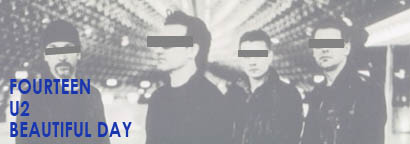
Both U2 and “Beautiful Day” have been so ubiquitous this decade – for better and for worse – that it’s easy to forget what a revelation their comeback single was when it hit in the fall of 2000. Post-Pop, U2 were, in Larry Mullen’s words, “the biggest little cult band in the world” and even a bit of a joke in the wake of the punchline-worthy Popmart tour. And in one fell swoop – and one reverb-heavy guitar riff – it all came soaring back: the passion, the professionalism, the sheer power of everything U2 had once stood for. It’s a song incredible enough that it tricked everyone into thinking that the accompanying album – All That You Can’t Leave Behind - wasn’t a boring, inconsistent record. And it’s the main reason U2 can claim to be the outright biggest band in the world as the decade winds to a close.
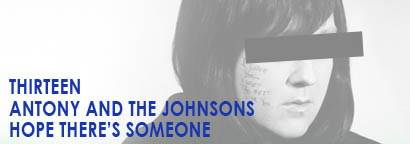
At many points this decade, I’ve felt overwhelmed by the sheer volume of music being discussed and debated, and in the wake of the deluge I start to tune things out. 2005 was one of those years for me, so when Pitchfork placed this unfamiliar song at the top of their year-end singles list – ahead of some personal favourites – I reacted with a giant “huh?” And I confess that when I downloaded the song and Antony’s affected vocal kicked in at first, I didn’t get it. But open minds find great rewards: as the song moved on, its empty soul grew more and more haunting, and by the time the strings kick in, I was overwhelmed. We have so much music at our fingertips these days that songs can lose their power quite easily, but “Hope There’s Someone” is every bit as moving as the first time I staggered through it.

At the risk of giving away which Strokes record ranks higher on next week’s albums list, I prefer “Hard to Explain” to pretty much every other song on Is This It because doesn’t feel loose and effortless. It feels like the sort of song that was overthought, overworked, overproduced and yet – in spite of it all – came out sounding completely amazing. I remember seeing the band on SNL – having not heard the record yet – and being a bit bored by “Last Nite.” But thank jeebus I stayed up for their second song, when the band’s crisp, clear professionalism pushed “Hard to Explain” to a whole new level of cool.

Less a song than a prophecy, less an opening track than a gospel, “Tunnels” was released as a vinyl single three months before Funeral, a sort-of teaser for the early street preachers. The rest of us soon-to-be converts first heard the song when we downloaded this strange new record that the cool kids were telling us about and pushed “play” in our iTunes, no idea what we were in for. From the rickety piano intro building to the song’s choral outro, it was like opening the Bible with the Book of Revelations. For all the decade’s brilliant anthems, none demanded action quite like this one, creating an army of evangelicals desperate to spread the good word of the Arcade Fire.





